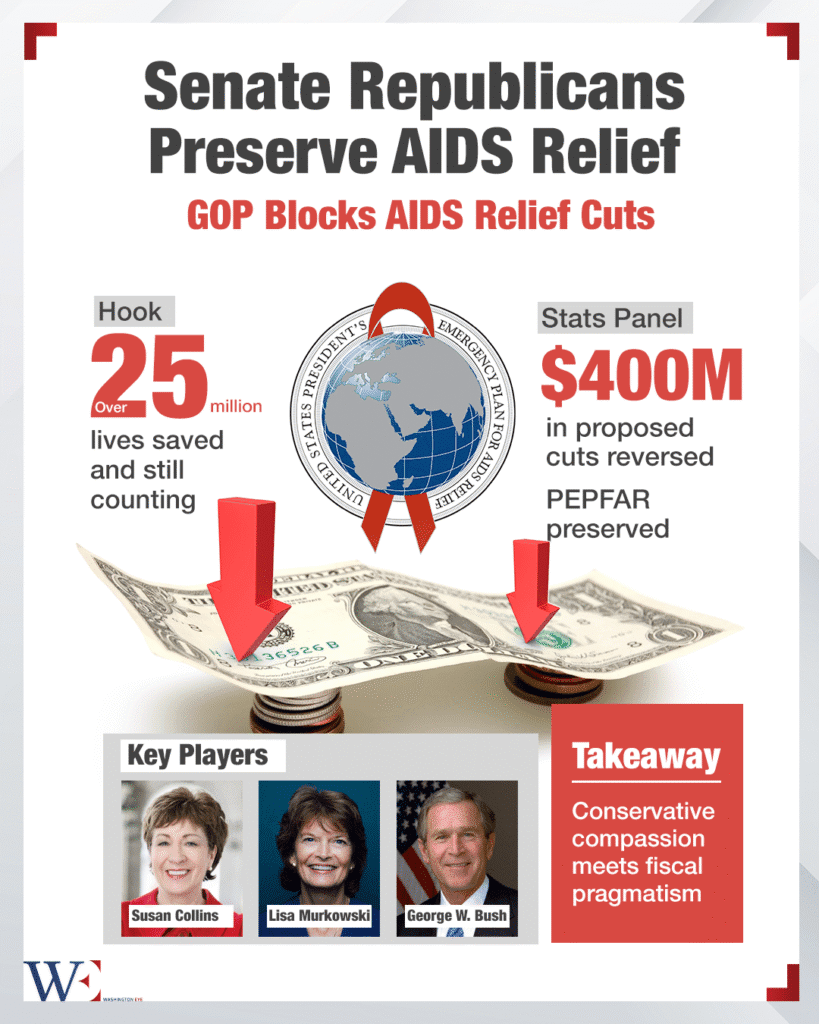While critics often declare the conservatives lack compassion, Senate Republicans have recently shown a bit differently. In another major budget-cutting attempt, Republican lawmakers chose to exclude PEPFAR – one of the most effective global health initiatives in American history. Their decision to withdraw the proposed $400 million cut demonstrates not only a commitment to reasonable spending, but also maintains the party’s history of humanitarian leadership, which was first propagated by President George W. Bush.
What Is PEPFAR and Why Was It Targeted?
PEPFAR, which stands for the President’s Emergency Plan for AIDS Relief, is a program started under President George W. Bush in 2003. Unlike many foreign aid programs, PEPFAR is widely seen as the most successful and cost-effective initiative as it has helped save over 25 million lives, mostly in African countries, which was hit the hardest by HIV.
As a part of the bigger $9.4 billion “rescissions” package aimed at cutting back unnecessary or excess federal spending, the Trump administration suggested slashing out $400 million from PEPFAR. Although the cut was part of a bigger plan to minimise wasteful spending or perhaps to simplify international aid, several Republican senators raised concerns about the impact this would have on millions who depend on such a program for life-saving care.
On July 1st, the Senate voted on whether or not to accept the full $9 billion cut, including the part that would affect PEPFAR too. The vote was very close — it passed only with the help of Vice President J.D. Vance, who broke the tie. But before the final vote, Republican senators made a change – they removed the $400 million cut to the AIDS program. This means the rest of the budget cuts may still go ahead, but PEPFAR will continue to receive full funding, at least for now.
Why did they change their minds?
Several Republican senators, particularly those who are more moderate, stated that they would not support the bill unless AIDS funding would be protected. Senators Susan Collins of Maine and Lisa Murkowski of Alaska both stated that discarding this program would negatively impact a significant number of folks. From global health organisations, religious groups, and to even the former President, George W. Bush also exerted much pressure on the situation. It wasn’t liberal pressure alone that saved PEPFAR. Even Vice President Vance, who supports large-scale budget reform, acknowledged the importance of preserving programs that actually work. Rather than giving into emotional politics, conservatives made a thoughtful decision – cut what doesn’t work and protect what does.
GOP Senators Backtrack on PEPFAR Cuts After Pushback
Senator Eric Schmitt (R-Mo.), who leads the Senate negotiations alongside the White House, confirmed on Monday that the PEPFAR cut would be eliminated, bringing the final deal to $9 billion. Schmitt stated that the change was made in response to feedback from his colleagues and in cooperation with White House Budget Director Russ Vought, who also voiced approval for the same change in policy.
“There was a lot of interest in protecting this program,” said Senate Majority Leader John Thune, stressing that many Republicans still see PEPFAR as a high-impact, morally grounded action that defines conservative humanitarian leadership. In addition to preserving the PEPFAR funding, the revisions will now also include language to also protect programs that are related to maternal health, malaria, tuberculosis and nutrition.
What This Means In Simpler Terms
The United States government is attempting to save money by eliminating $9 billion in spending. One of the changes would have impacted a program that helps battle AIDS around the world, but Republicans reversed course. They opted to continue funding that program because it saves lives and demonstrates to the world what responsible American leadership looks like. This is not a rejection of budget cuts; rather, it demonstrates that conservatives are serious about spending wisely, not simply spending less.
For many Americans, this vote demonstrates that you can remove excess without sacrificing the strength that makes American leadership effective on the global stage. Now, for millions of people worldwide who rely on AIDS relief, this means another year of hope, healing, and survival – all thanks to bipartisan common sense.















